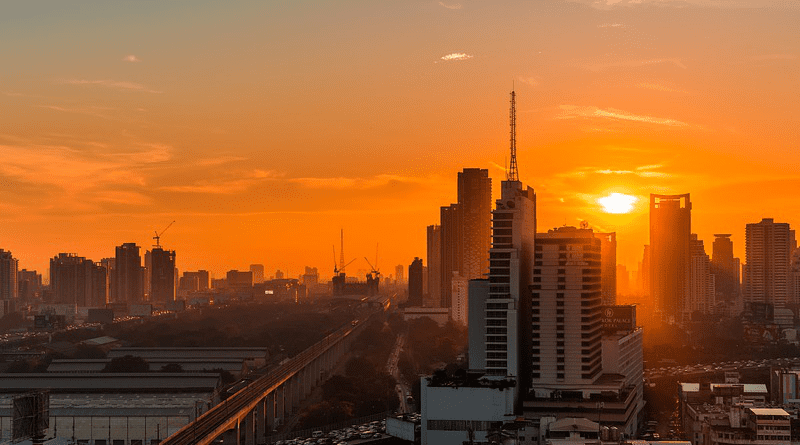A Partnership For Posterity: India And Thailand – Analysis
Despite the fact that Thailand and India were reluctant partners during the Cold War, this relationship has grown incrementally over the past three decades. A huge Indian diaspora, cultural and religious connections have been the bulwark for strengthening ties between our two nations.
Ever since 2012, when Yingluck Shinawatra, the then Prime Minister of Thailand visited India, there has been a significant growth momentum in bilateral ties. Both nations view each other as valuable partners not only in regional groupings as the East Asia Summit (EAS), (Bay of Bengal Initiative for Multi-Sectoral Technical and Economic Cooperation) BIMSTEC and Mekong Ganga Cooperation (MGC), and the Indo-Pacific Economic Framework (IPEF)but also as friends who carry no historical baggage of distrust or hostility. Thailand acknowledges India’s rising regional and global stature and as a burgeoning manufacturing hub with emerging opportunities for Thai investors and entrepreneurs. The Prime Minister of Thailand, Srettha Thavisin, himself, in a statement to the National Assembly on September 11, 2023, hailed India as the new market for Thailand.
Notably, 2024 began a vision for the highest level of fortification of Bangkok’s ties with New Delhi. The near simultaneity of several events which have lent optimism include, among others, a rare appearance of the Thai Prime Minister Srettha Thavisin at a reception to celebrate India’s 75th Republic Day hosted by the Indian Embassy in Bangkok, official participation of the Royal Thai embassy at an International Conference in New Delhi on India@2030: Third largest economy on January 29-30, the Namaste Thailand festival held on February 24-25, the visit of the Vice Minister for Foreign Affairs Sihasak Phuangketkeow Phuangketkeow to India on February 26 for strengthening bilateral ties in trade, technology, defense and other areas of mutual cooperation, preceded by the enshrinement of holy relics of Lord Buddha in Bangkok for 26 days. These positive developments were in complete contrast to the remarks of Thailand’s ambassador to WTO at Abu Dhabi on February 29, 2024. Evidently, neither India nor Thailand could permit a dent in this promising strategic partnership, which is purposed with an imperative for building strategic ties for a stable Indo-Pacific.
The fact that no stumbling block can deter this partnership is manifest in the decision of the Thai government to immediately replace its Ambassador to WTO Pimchanok Vonkorpon Pitfield on her remarks on India’s rice procurement programme. In her statement at the World Trade Organisation’s 13th ministerial conference (MC), she criticised India’s policy of Minimum Support Price (MSP), alleging that this was meant not for the public distribution system (PDS) but for capturing the export market. India was quick to lodge a stern protest against her statement. India formally lodged its protest with the Thai government and expressed dissatisfaction to various entities, including WTO chief Ngozi Okonjo-Iweala, the agricultural committee chair of Kenya, and the UAE.
An official statement by the Royal Thai Government was released shortly after the protest lodged by India. The statement read, “The Thai Ambassador has been replaced. She has ridiculed India’s public stockholding programme,” the source said. Moreover, Pitfield has been asked to report back to Thailand after the 13th ministerial conference and would be replaced by the Thai Foreign Secretary.
Evidently, Thailand’s ambassador was unaware that India has not yet lifted the ban on exports of rice, which was imposed for domestic compulsions in mid-2022, followed by further restrictions in July 2023. In fact, Thailand has benefitted in terms of rising export earnings from rice, the price of which has risen by 22% since India’s export ban on non-basmati white rice took effect. However, as the second largest exporter of rice in the world, Thailand is justifiably concerned not only for its exports, but also for its own food security. The country has also been suffering from droughts caused by the El Niño weather event, which is drying up land for the growth of key crops in the country’s farmlands.
According to IFPRI, the ban by India is resulting in stresses for developing countries. However, India has been exporting rice to countries as Bhutan, Nepal and UAE among others who have placed such requests with the Indian Government. As a credible and leading Voice of the Global South, India has never faltered in reaching out to nations in times of any crisis; be it saving lives of civilians or sailors.
An IFPRI paper by Glauber and Mamun contextualises the issue of rice production and expresses optimism for a positive turnaround. The authors state, “Global rice markets have been in a state of flux, as impacts of El Niño reduced production in South and Southeast Asia and India reduced exports by half. Rice-importing countries in sub-Saharan Africa have felt the greatest impacts, scrambling to find alternative sources, even as global rice prices have risen more than 20% since India imposed its restrictions. But forecasts projecting that the current El Niño will wane over the next few months offer some hope for improved future production prospects.”
Such an improved situation will help steer India’s policy on rice exports. The challenge of food security cannot be dismissed by any nation; let alone a nation that feeds over 1.4 billion people. Thailand is also keen that India joins the Regional Comprehensive Economic Partnership (RCEP), the largest free trade area in the World. However, when India decided to steer clear of the RCEP in 2019, there were clear justifications for the decision. Both countries underline the significance of domestic obligations. While Thailand’s Self-sufficiency economy model is embedded within the fundamental principle of Thai culture, India’s Atmanirbhar Bharat is enshrined with a vision for making the nation and its citizens independent and self-reliant in every possible way. Hence, there is conviction, both in New Delhi and in Bangkok that remarks on rice cannot checkmate the India-Thailand partnership, one which is meant for posterity.

